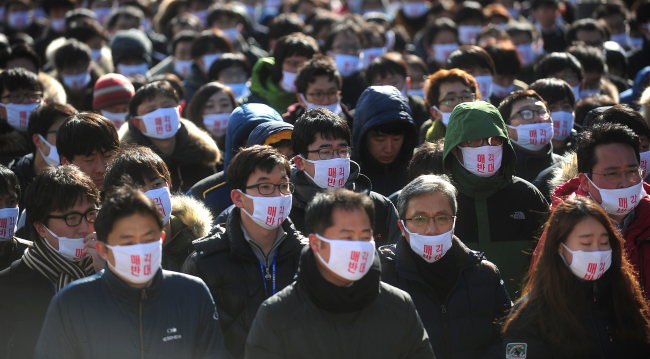[Weekender] ‘Samsung Man’ not just a job
Desperate to keep title, workers of sold affiliates take to streets
By Korea HeraldPublished : March 6, 2015 - 19:47
Kim, 45, vividly remembers when Samsung Group divested all shares in its discount store retail chain to U.K.-based retailer Tesco in 2011. His company was subsequently renamed from Homeplus Samsung Tesco to Homeplus, which meant it was time for him to give up the pride of being a “Samsung Man.”
Kim says he felt like being deprived of his social status and respect from his family and friends.
Now, some 7,500 Samsung workers whose companies were sold to Hanwha last year are going through the same agony as Kim did four years ago.
Kim says he felt like being deprived of his social status and respect from his family and friends.
Now, some 7,500 Samsung workers whose companies were sold to Hanwha last year are going through the same agony as Kim did four years ago.

In November, Samsung Group decided to sell four affiliates to Hanwha Group in a deal estimated at 1.9 trillion won ($1.7 billion). The purchase is expected to be completed by the first half of this year.
Under the deal, Samsung is offloading its shares in defense unit Samsung Techwin and chemical arm Samsung General Chemicals to Hanwha, another family-owned group whose main businesses include defense and solar power.
Two other affiliates, Samsung Thales and Samsung Total Petrochemicals were automatically included in the deal as they are half-owned by the companies being sold to Hanwha.
“Some people think becoming a ‘Hanwha Man’ from ‘Samsung man’ is just a matter of name change. But trust me, it is more than just that,” a worker from Samsung Techwin said on condition of anonymity.
The employee, who is part of the newly formed union of the affiliates, claimed there is no documentation on job security. Samsung has maintained a “no labor union” policy since it was founded 77 years ago.
“We’re afraid there’s going to be discrimination on wages as well as welfare benefits, which will be followed by a restructuring process,” he said.
Regarding these concerns, Hanwha Group officials said it formed a task force to take care of workers’ employment succession and job security.
“We promise a safe employment succession in the four affiliates and promise our trust to the workers. We welcome our new family with trust,” said Shim Kyung-seb, representative director of Hanwha’s defense division.
In South Korea, getting a job at Samsung is often regarded a ticket to a “good life.”
Believing that becoming a member of Samsung can give them higher social status and influence, college students spend months and years in the battle to pass Samsung’s entrance exam, the Samsung Aptitude Test.
Some pay 500,000 won ($454) to 1 million won for academies on SSAT and English tests.
“For our parents’ generation, Samsung was a leading conglomerate that helped the country’s postwar economic development,” said Choi In-jung, a college graduate.
“One of the reasons why I want to get into Samsung is so that my parents can boast about their daughter becoming part of the No. 1 conglomerate.”
However, it was hundreds of fresh college graduates who got the golden ticket at the four affiliates last year who lost their dream status overnight.
“Am I a Samsung employee or Hanwha employee? My family just celebrated my new job but the good news just turned bad,” a newly employed worker at Samsung Techwin wrote on Sungkyunkwan University’s student website after the acquisition.
Regardless of the workers’ agony, Samsung and Hanwha’s so-called “mega deal” is regarded as one of the most successful deals in history.
Samsung was able to lessen the burden amid sliding profits and help streamline business areas. Hanwha climbed one notch to be the No. 9 conglomerate in the country by acquiring the defense and chemical units that focus on its core competency.
Hanwha, whose flagship unit is Hanwha Chemical, said the acquisition would help it become South Korea’s biggest petrochemical business in terms of revenue.
By Suk Gee-hyun (monicasuk@heraldcorp.com)
-
Articles by Korea Herald




















![[Today’s K-pop] BTS pop-up event to come to Seoul](http://res.heraldm.com/phpwas/restmb_idxmake.php?idx=642&simg=/content/image/2024/04/17/20240417050734_0.jpg&u=)